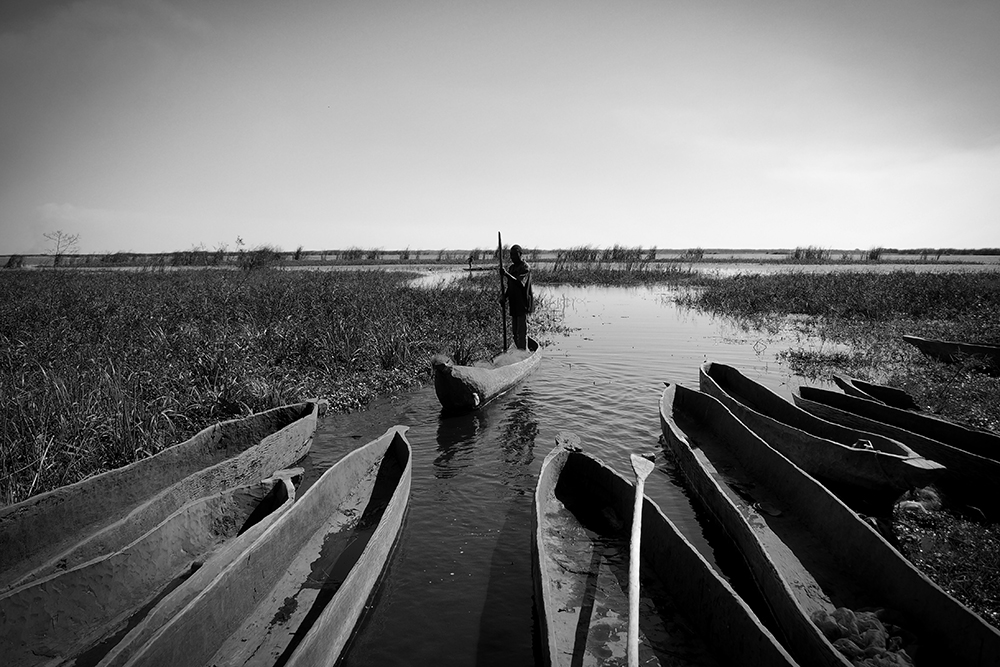
By James Jamu | 28 September 2021
BALANCING in a dugout canoe on Lake Liambezi, Kennedy Muyambe untangles his net with other fishermen, while his 11-year-old son lies playfully nearby.
They’re preparing for their evening fishing expedition – largely illegally – on a lake that is a cautionary tale of the perils of climate change.
He hopes the money he earns from fishing will put his son through school. At the squatter camp facing the lake, catfish caught the previous day lie in rows, cleaned and skinned, ready for buyers who come from as far as Lubumbashi, the third-largest city in the Democratic Republic of Congo.
“I wanted to be a soldier when I was in school,” Muyambe, now in his 40s, says as he unrolls the nylon net. But he dropped out of school before completing Grade 10, making him ineligible to enlist.
Struggling to find work, he started fishing five years ago – without a licence, with a banned net, sometimes selling to international smugglers who exploit the difficulties in patrolling this distant lake near the tip of Namibia’s panhandle.
The nearest town is Katima Mulilo, 60km and more than an hour away. The lake is home to the tilapia fish (Zambezi bream).
A life of fishing wasn’t possible when Muyambe was his son’s age.
DEADLY HELLSCAPE
For most of his life, the lake was bone dry. The waters are fed by flood run-off from the Zambezi River, but that water supply became more erratic in the 1980s, until the lake disappeared in 1985, sometimes devolving into a deadly hellscape.
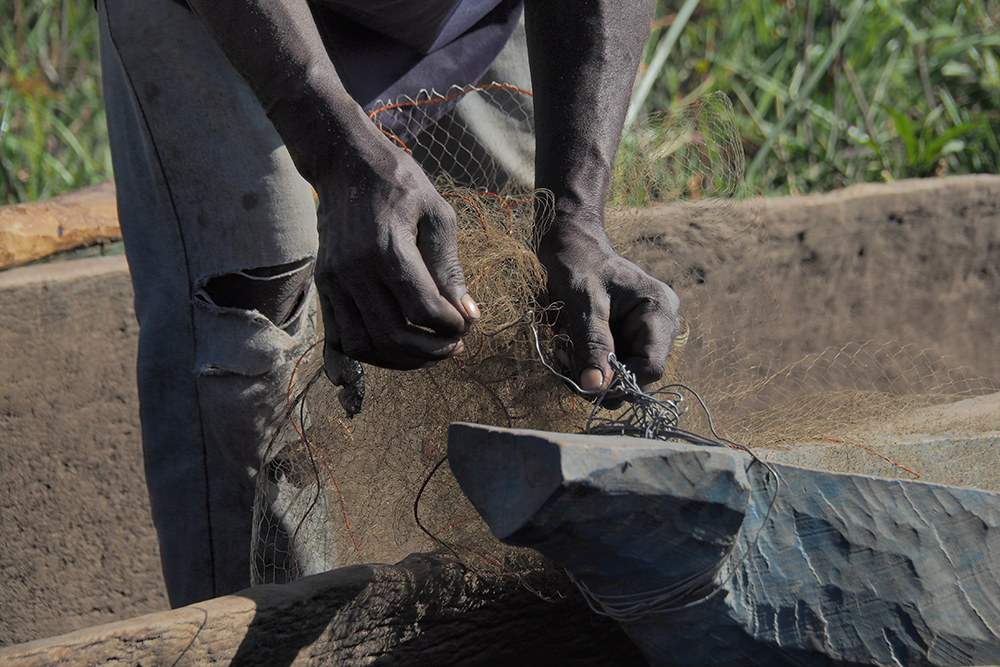
The lake bed became so dry that even the roots of reeds dried out. Bush fires ignited the reeds, but the fires spread underground through the root system.
Several people fell through the cracked earth into the blazes below.
Animals moved away, and people eventually built homes on the exposed lakebed. In 2007, some water returned. Biblical floods in 2009 refilled it, and brought in new species of fish that have now repopulated the lake.
Along with the fish came elephants, hippos, kudu and other wildlife, competing with the villages for access to the renewed water source.
Muyambe was undeterred.
“When we see hippos, we know how to handle them,” says the slender, soft-spoken man, as he launches his mukoro dugout canoe into the lake, beneath a peachy sunset.
Others were less brave.
“You can’t drive here during the night. There’ll be elephants everywhere,” says Joe, who came from 60km away to buy fish wholesale.
“Imagine having to see those big things alone as you walk back home. It could never be me.”
He’s right to be afraid. More animals are coming. Lake Liambezi is shrinking again, but the nearby Linyanti River has already dried up. Two fishermen on the lake were killed by hippos in 2018.
Fishermen like Muyambe know the lake could disappear again. Many bodies of water in the Zambezi region are considered ephemeral by scientists, because they depend on the annual floodwaters to refill. Larger lakes like Liambezi can last for years, but as weather patterns change, the future is becoming more uncertain.
For now, there’s money to be made. Even if it means breaking the law.
After the lake filled up in the years of floods, fishing boomed.
In 2012, an estimated 2,7 million kilogrammes of fish were caught – more than four times the catch in 1974, the last time the lake was completely full.
CRIME BOOM
During these recent boom years, the lake has gained notoriety as a hub of illegal fishing, smuggling, and cross-border wildlife crimes.
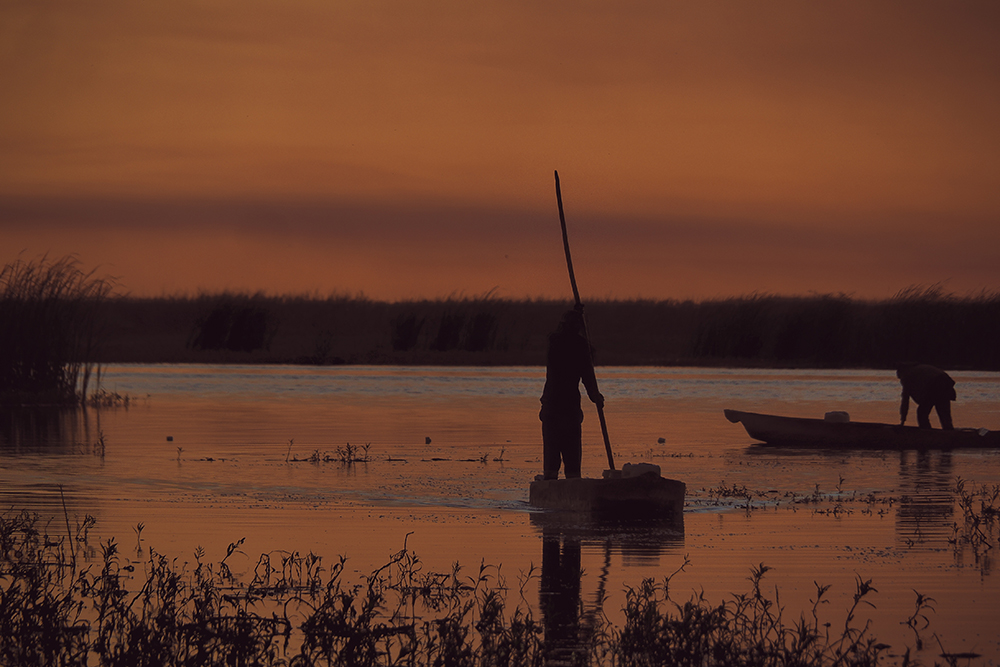
In September 2020, the police confiscated dried fish headed for the Democratic Republic of Congo, where it would have fetched a premium price.
Last year, the police announced they intercepted the “looting and plundering of Namibian natural resources by Zambians and Congolese nationals in Zambezi region”.
“Information has it that the illegal dried fish is being smuggled from Namibia through Zambia and sold at high prices in the DRC … at Katumbalesha,” the police said.
Police chief, inspector general Sebastian Ndeitunga yesterday told The Namibian illegal fishing is a serious problem in the area. He has in the past likened the group to a “well-organised criminal syndicate”.
“These criminals are involved mostly in plundering fishery resources in Lake Liambezi,” he said.
TRANSNATIONAL SYNDICATES
“We are looking for the lady from Lubumbashi, do you know who she is?”
We ask every fisherman we came across at Muyako, a village near the lakeshore. They all seem baffled and claim not to know who she is.
This mystery lady has supposedly flown in from DRC to source fish for her high-paying buyers back home.
The Zambezi police suspect she belongs to one of the syndicates that smuggle fish and game meat out of the region.
The fish is said to reach as far as the Kasumbalesha border between Zambia and the DRC, more than 1 000km away.
“Illegal immigrants come from as far as Zambia and DRC to pose as locals. They smuggle fish and game meat through the Zambezi River with mukoro canoes,” says Morgan Saisai, a police officer.
“The main problem we are facing is our own people,” Zambezi governor Lawrence Sampofu says.
“They are employing people from Zambia and beyond Namibia’s borders.
“We face a situation in which our people pretend that these illegal immigrants are part of their extended family,” he says.
The most prized fish in Lake Liambezi are tilapia and sharp-tooth catfish, which are sold to distributors that channel the fish to Rundu, almost 600km west.
People in the Zambezi region don’t like catfish. They think its skin is too snake-like. But at the Rundu market, the catfish averages N$80 a kilo.
From there, private shuttles transport the fish to populous areas like Oshakati every day.
Ekkehard Klingelhoeffer from the University of Namibia’s Department of Agriculture once spent a day with a fish trader. He says stock arrives around 08h00 at Rundu and Oshakati, and is sold out by noon.
However, for as brisk as the local trade is, the real spoils come from illicit Congolese and Zambian markets.
THE BUSINESS OF SMUGGLING
In Zambezi, the police estimate that 90% of fishermen don’t have fishing permits and use banned gear – like nylon nets.
While those nets are strong, if they snag on rocks, they’re no longer usable and often left in the water where they still snarl fish, which die pointlessly.

Policing for fishing crimes is incredibly difficult.
The wildlife management area that includes Lake Liambezi covers 11 000 square kilometres – an area half the size of Ethosha National Park – with only six inspectors tasked with preventing smuggling.
“Harvesting any resource without a permit is poaching,” said Morgan Saisai.
By that standard, almost all the fishermen in the area are poachers.
It’s not just fish that are poached. Buffaloes, elephants and kudus, which also depend on the lake’s water, are also hunted by fishermen.
“When they are camping there, they conduct illegal hunting at night, which is when animals move,” Saisai says.
The game meat is then bundled up with the fish in sacks that weigh up to 90kg each.
Then informal couriers, taxis, and minibus drivers move the sacks to small villages, where they pay other fishermen to paddle their illicit products by canoe, bypassing border patrols, until they reach Livingstone in Zambia.
Cracking down on the smugglers would require significantly more resources.
“They need helicopter patrols,” says Saisai.
“There’s a challenge of implementation of the Immigration Act. It is not enforced appropriately. The people are harboured by the locals.”
He would like broader law enforcement to also arrest Namibians who work with the smugglers.
Saisai says law-enforcement agencies have formed a new cluster to work together and pool resources, but for now Covid-19 precautions have kept that plan from getting off the ground.
Fishermen like Muyambe are more worried about their day-to-day survival than the possibility of arrest.
Around 18h00, as the sunset turns the sky to peachy hues, he walks across barren land that once lay beneath the lake.
Moments before daylight surrenders to nightfall, Muyambe joins the cluster of mukoro canoes descending one by one into unpredictable waters.
*This article has been produced by The Namibian’s Investigative Unit with the support of the Open Society Initiative for Southern Africa.
Send story tips via your secure email to [email protected]

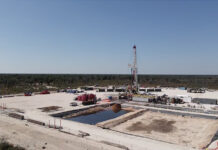


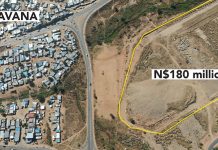
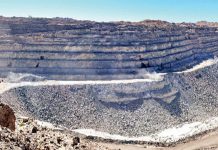
Your point of view caught my eye and was very interesting. Thanks. I have a question for you.
pin-up oyunu https://azerbaijancuisine.com/# pin-up cazino
pin up az
pin up azerbaijan: pin up az?rbaycan – pin up
buying from online mexican pharmacy mexican mail order pharmacies reputable mexican pharmacies online
п»їbest mexican online pharmacies: mexican northern doctors – medication from mexico pharmacy
best online pharmacies in mexico: Mexico pharmacy that ship to usa – buying prescription drugs in mexico online
http://northern-doctors.org/# buying from online mexican pharmacy
п»їbest mexican online pharmacies mexican pharmacy online buying from online mexican pharmacy
mexican online pharmacies prescription drugs: mexican pharmacy online – mexican pharmacy
mexican rx online: mexican pharmacy – medication from mexico pharmacy
buying from online mexican pharmacy: mexican northern doctors – best online pharmacies in mexico
https://northern-doctors.org/# mexican rx online
mexican mail order pharmacies: northern doctors pharmacy – mexico drug stores pharmacies
pharmacies in mexico that ship to usa mexican pharmacy online medicine in mexico pharmacies
best online pharmacies in mexico: mexican northern doctors – mexico pharmacy
mexico pharmacies prescription drugs: northern doctors pharmacy – mexico pharmacy
http://northern-doctors.org/# mexican online pharmacies prescription drugs
medication from mexico pharmacy: mexican pharmacy – mexico drug stores pharmacies
http://northern-doctors.org/# mexican mail order pharmacies
buying prescription drugs in mexico online: mexican pharmacy – п»їbest mexican online pharmacies
In Chicago, residents have access to proficient fridge repair services located within the city. There’s no need to search any further if you’re seeking assistance from subzerorepair247.com.
mexican border pharmacies shipping to usa northern doctors mexican rx online
https://northern-doctors.org/# medication from mexico pharmacy
mexican online pharmacies prescription drugs: best online pharmacies in mexico – best online pharmacies in mexico
mexico drug stores pharmacies: Mexico pharmacy that ship to usa – mexico pharmacy
mexican drugstore online mexican pharmacy online pharmacies in mexico that ship to usa
mexican pharmaceuticals online: mexican pharmacy – buying prescription drugs in mexico online
https://northern-doctors.org/# reputable mexican pharmacies online
mexican rx online: mexican pharmacy – mexican border pharmacies shipping to usa
http://northern-doctors.org/# mexican drugstore online
best online pharmacies in mexico: buying prescription drugs in mexico online – mexico drug stores pharmacies
mexico drug stores pharmacies: mexican pharmacy northern doctors – purple pharmacy mexico price list
http://northern-doctors.org/# mexico drug stores pharmacies
mexico drug stores pharmacies: mexican pharmacy online – buying prescription drugs in mexico online
https://northern-doctors.org/# mexican border pharmacies shipping to usa
buying from online mexican pharmacy: mexican pharmacy northern doctors – mexico drug stores pharmacies
mexican online pharmacies prescription drugs: mexican northern doctors – mexican pharmacy
https://northern-doctors.org/# medication from mexico pharmacy
buying prescription drugs in mexico: northern doctors pharmacy – mexico pharmacy
https://northern-doctors.org/# buying prescription drugs in mexico online
buying prescription drugs in mexico: mexican pharmacy – buying prescription drugs in mexico
https://northern-doctors.org/# mexican pharmacy
mexican border pharmacies shipping to usa: northern doctors pharmacy – mexico pharmacy
mexican drugstore online mexican pharmacy online mexico drug stores pharmacies
mexico pharmacies prescription drugs: Mexico pharmacy that ship to usa – mexico drug stores pharmacies
At an unbeatable price, we strive to deliver top-notch appliance maintenance and repair services for your Sub Zero refrigerators. Our team of experienced professionals is equipped to address a range of issues, from faulty fans to dirty oils and damaged compressors. Trust us to get your refrigerator cooling system back on track.
https://northern-doctors.org/# mexican pharmacy
п»їbest mexican online pharmacies: pharmacies in mexico that ship to usa – mexico drug stores pharmacies
mexico pharmacies prescription drugs: northern doctors – п»їbest mexican online pharmacies
https://northern-doctors.org/# buying prescription drugs in mexico online
medication from mexico pharmacy: mexican border pharmacies shipping to usa – mexico pharmacies prescription drugs
pharmacies in mexico that ship to usa: northern doctors pharmacy – mexican online pharmacies prescription drugs
medicine in mexico pharmacies Mexico pharmacy that ship to usa mexican border pharmacies shipping to usa
best online pharmacies in mexico: mexican pharmacy northern doctors – mexico pharmacy
medicine in mexico pharmacies: northern doctors – mexican online pharmacies prescription drugs
http://northern-doctors.org/# mexican rx online
mexican online pharmacies prescription drugs: Mexico pharmacy that ship to usa – mexican rx online
mexican online pharmacies prescription drugs cmq pharma mexico pharmacies prescription drugs
mexican online pharmacies prescription drugs mexican pharmacy medicine in mexico pharmacies
mexican pharmacy online mexican pharmacy purple pharmacy mexico price list
mexican online pharmacies prescription drugs: online mexican pharmacy – mexican online pharmacies prescription drugs
buying prescription drugs in mexico online
http://cmqpharma.com/# mexican border pharmacies shipping to usa
mexican rx online
mexican rx online cmq mexican pharmacy online buying prescription drugs in mexico online
medication from mexico pharmacy cmqpharma.com medicine in mexico pharmacies
buying prescription drugs in mexico mexican pharmacy mexican pharmaceuticals online
reputable mexican pharmacies online cmq pharma mexican rx online
https://cmqpharma.online/# mexican drugstore online
mexico pharmacy
mexican mail order pharmacies mexico drug stores pharmacies purple pharmacy mexico price list
achat de médicaments à Québec sandoz Steyr Se puede adquirir
medicamentos en Italia
mexican pharmaceuticals online: cmqpharma.com – mexico drug stores pharmacies
buying from online mexican pharmacy
https://cmqpharma.online/# reputable mexican pharmacies online
mexico drug stores pharmacies
pharmacies in mexico that ship to usa: cmqpharma.com – mexican pharmaceuticals online
buying from online mexican pharmacy
https://cmqpharma.online/# pharmacies in mexico that ship to usa
п»їbest mexican online pharmacies
What an amazing article! I learned so much new information. The writing is very structured and easy to follow. Thank you for presenting such high-quality content!
Best online game web: KINGSLOT96
mexican rx online: mexican pharmaceuticals online – mexican drugstore online
mail order pharmacy india pharmacy website india online shopping pharmacy india
https://canadapharmast.online/# canadianpharmacymeds com
cross border pharmacy canada: escrow pharmacy canada – canada discount pharmacy
medicine in mexico pharmacies: mexican mail order pharmacies – п»їbest mexican online pharmacies
mexican border pharmacies shipping to usa buying prescription drugs in mexico online buying prescription drugs in mexico online
trustworthy canadian pharmacy: best online canadian pharmacy – drugs from canada
online pharmacy india: india pharmacy mail order – top 10 pharmacies in india
canadian pharmacy review: ed drugs online from canada – best online canadian pharmacy
https://canadapharmast.com/# thecanadianpharmacy
purple pharmacy mexico price list medication from mexico pharmacy mexico drug stores pharmacies
canada drugs online: canada drugs – canadian pharmacy india
purple pharmacy mexico price list: medication from mexico pharmacy – medicine in mexico pharmacies
real canadian pharmacy: canadianpharmacyworld com – best canadian pharmacy to buy from
canadian pharmacy no scripts canadianpharmacyworld com reputable canadian pharmacy
https://foruspharma.com/# purple pharmacy mexico price list
reputable indian pharmacies: top 10 online pharmacy in india – india pharmacy mail order
Online medicine order: reputable indian online pharmacy – п»їlegitimate online pharmacies india
http://paxloviddelivery.pro/# paxlovid india
cost of cheap clomid pill: where buy clomid without dr prescription – buying clomid without rx
https://doxycyclinedelivery.pro/# doxycycline 50mg tab
https://doxycyclinedelivery.pro/# order doxycycline canada
buy cipro online without prescription: buy cipro online usa – cipro pharmacy
https://doxycyclinedelivery.pro/# buy doxycycline uk
paxlovid cost without insurance: п»їpaxlovid – paxlovid for sale
http://doxycyclinedelivery.pro/# doxycycline 100mg tablets no prescription
https://amoxildelivery.pro/# amoxicillin for sale
buy generic ciprofloxacin: cipro pharmacy – cipro pharmacy
https://ciprodelivery.pro/# buy generic ciprofloxacin
http://ciprodelivery.pro/# where can i buy cipro online
http://ciprodelivery.pro/# cipro ciprofloxacin
paxlovid for sale [url=http://paxloviddelivery.pro/#]paxlovid pharmacy[/url] paxlovid pill
where can i get amoxicillin 500 mg: amoxicillin tablet 500mg – amoxicillin 500mg buy online uk
http://clomiddelivery.pro/# can i get clomid
amoxicillin 500mg pill: buy amoxicillin online cheap – amoxicillin 500 mg without prescription
can i order generic clomid no prescription: get generic clomid price – where to get generic clomid